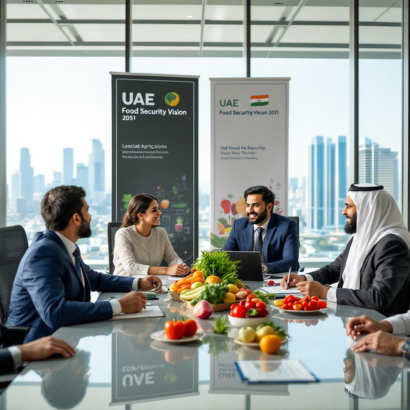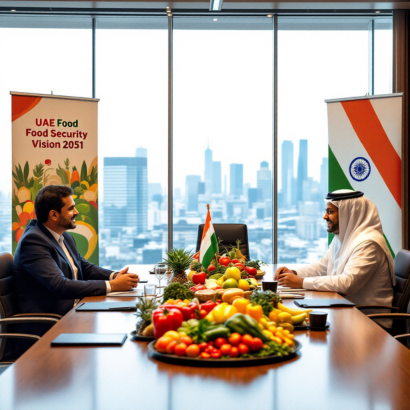A Strategic Partnership Rooted in Sustainability, Innovation, and Trust
The United Arab Emirates (UAE) has laid out a comprehensive long-term roadmap under its Food Security Vision 2051, aiming to become a global hub in food innovation and ensure sustainable food supplies across the region. For Indian agri exporters, this is not just an opportunity—it is a call to align capabilities with one of the most forward-thinking food security frameworks in the world.
India, with its vast agro-climatic diversity, surplus production, and emerging export infrastructure, is in a strong position to play a pivotal role in UAE’s strategic goals. However, to ensure a consistent and impactful contribution, Indian exporters must go beyond transactional trade and embrace a shared vision based on long-term value.Understanding UAE Food Security Vision 2051
At its core, the UAE Food Security Vision 2051 is built around:
- Enhancing local food production through advanced technologies
- Securing reliable international supply chains
- Promoting sustainable agricultural practices
- Developing strategic international partnerships
This vision recognizes the UAE’s reliance on imports due to limited arable land and water scarcity. It opens the door for trusted partners like India to become essential contributors—not just suppliers.

Key Alignment Avenues for Indian Agri Exporters
1. Build Supply Chain Reliability
UAE seeks partners who can guarantee uninterrupted, quality-controlled supply chains. Indian exporters can stand out by investing in cold chain logistics, digitized traceability systems, and certified processing units. Offering transparency, consistency, and speed will differentiate Indian products in the GCC market.
2. Export High-Demand, Climate-Resilient Crops
UAE’s import basket prioritizes staples like rice, pulses, spices, fresh fruits, vegetables, and dairy alternatives. By focusing on high-yield, climate-resilient variants and aligning with Emirati consumption trends, Indian agri businesses can ensure product relevance across future decades.
3. Leverage Agri-Tech Collaborations
By integrating precision farming, blockchain-enabled traceability, and AI-driven supply forecasts, Indian exporters can sync with UAE’s digital-first food ecosystem. These innovations reassure UAE stakeholders about long-term sustainability, ethical sourcing, and food safety standards.
4. Offer Customized, Nutrient-Dense Products
With increasing focus on health, nutrition, and functional foods, exporters who adapt product lines to match UAE’s consumer demands—such as fortified flours, organic pulses, and minimally processed superfoods—will strengthen their positioning as long-term solution providers.
5. Invest in Sustainability Certifications
UAE’s vision is sustainability-centric. Indian exporters who demonstrate environmental responsibility through global certifications (GlobalG.A.P., Fair Trade, Rainforest Alliance, etc.) and adopt sustainable packaging solutions will appeal to the UAE’s regulatory and commercial stakeholders alike.
Going Beyond Trade: The Diplomacy of Food Security
Aligning with UAE Food Security Vision 2051 is more than an economic move—it is a form of strategic diplomacy. Indian exporters must position themselves as partners in resilience, contributing to a shared future of regional stability, nutritional well-being, and food innovation.
Opportunities also exist for bilateral R&D, tech exchange, and government-to-business (G2B) initiatives. Forward-thinking exporters should actively engage in UAE-based food expos, agri-innovation forums, and sustainability summits to deepen visibility and trust.
Final Thoughts: A Vision Shared Is a Vision Realized
India and the UAE share centuries of trade heritage, and the next frontier is strategic agri-collaboration aligned with long-term national interests. Indian agri exporters, especially SMEs and agro-startups, have a rare chance to embed themselves into the fabric of UAE’s food future—not as outsiders, but as co-architects.
To do so, the approach must be visionary, scalable, and value-driven. The road to 2051 is long—but the seeds of success must be sown today.


